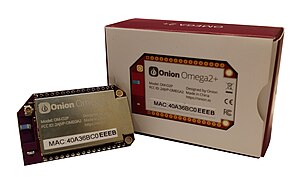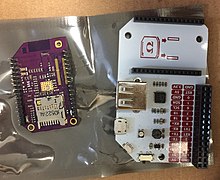| The topic of this article may not meet Misplaced Pages's notability guidelines for products and services. Please help to demonstrate the notability of the topic by citing reliable secondary sources that are independent of the topic and provide significant coverage of it beyond a mere trivial mention. If notability cannot be shown, the article is likely to be merged, redirected, or deleted. Find sources: "Omega2" computer – news · newspapers · books · scholar · JSTOR (June 2018) (Learn how and when to remove this message) |
 Omega2 Omega2 | |
| Release date | 20 November 2016; 8 years ago (2016-11-20) |
|---|---|
| Introductory price |
|
| Operating system | FreeBSD Linux OpenWrt |
| System on a chip | MediaTek MT7688 |
| CPU | 580 MHz 32-bit computing Single-core MIPS 24KEc |
| Memory | 64 MB (128 MB for Omega2 Plus) |
| Storage | 16 MB (32 MB and a MicroSDHC slot for Omega2 Plus) |
| Graphics | No graphic |
| Power | 0.6 Watts |
The Onion Omega series of personal single-board computer created by a startup company called Onion that is based in Boston, Toronto and Shenzhen. It is advertised as "the world's smallest Linux Server". The system combines a tiny form factor and power-efficiency with the power of a general purpose Operating System. They ship with a Linux kernel based lightweight operating system for embedded systems called OpenWRT, but is capable of running other lightweight Unix-based operating systems.
The first shipments of the Onion Omega went out in October, 2015.
History
Omega2 is the next generation of the old product Onion makes, Omega. The original Omega was based on the Qualcomm Atheros AR9331 (MIPS architecture) SoC which runs a full Linux operating system designed for embedded system and sold for $19.99. The company has discontinued development of the Omega, and replaced it with the successor, Omega2, using another SoC chip - Mediatek MT7688 which also has a metal cover over the chip. They have also drastically cut the price to $5 (but later increased it to $7.5).
As of the beginning of 2017, Onion has already attracted crowdfunding of more than $850,000 for the Omega2, which has greatly exceeded their initial goal of $440,000.

Hardware Features
Omega2 comes in two versions, the basic Omega2 and Omega2 Plus. Omega2 CPU is based on MIPS architecture running at 580 MHz clock speed, equipped with 64 MB of RAM and 16 MB of flash memory. Omega2 Plus is similar to Omega2, except it has 128 MB RAM and 32 MB memory and a MicroSD slot, sold for $9 USD. The system comes in a small PCB footprint with dual-in-line 16x2mm pins. The board runs at 3.3 volts with an average power consumption of 0.6W. The devices are intended for as headless computers with no graphical interfaces in Embedded systems.

| Feature | Omega2 | Omega2 Plus |
|---|---|---|
| CPU | MIPS32 24Kc | MIPS32 24Kc |
| Clock | 580 MHz | 580 MHz |
| RAM | 64 MB | 128 MB |
| Storage | 16 MB | 32 MB |
| USB | One USB 2.0 | One USB 2.0 |
| SD Slot | - | One MicroSD slot |
| WiFi | b/g/n | b/g/n |
| GPIO | 15 | 15 |
| PWM | 2 | 2 |
| UART | 2 | 2 |
| IC | 1 | 1 |
| SPI | 1 | 1 |
| IS | 1 | 1 |
References
- "Omega2: $5 Linux Computer with Wi-Fi, Made for IoT". Retrieved November 1, 2016.
- "Shipping Update".
- "Omega". Retrieved November 1, 2016.
- "MT7688 | MediaTek Labs". MediaTek Labs. Archived from the original on 2017-02-24. Retrieved 2017-02-23.
- Onion Omega2 Documentation
- "Can the Omega 2 Replace Raspberry Pi? The $5 Linux IoT Module". Retrieved November 1, 2016.
- "Omega2 Plus". Retrieved November 1, 2016.
External links
| Single-board computer and single-board microcontroller | |||||||
|---|---|---|---|---|---|---|---|
| Devices | |||||||
| SoCs |
| ||||||
| Software | |||||||
| (non-Android) Linux-powered devices | ||||||||||||||
|---|---|---|---|---|---|---|---|---|---|---|---|---|---|---|
| Computers, components |
|  | ||||||||||||
| Accessories |
| |||||||||||||
| Historic | ||||||||||||||
| Excluding Android devices. | ||||||||||||||